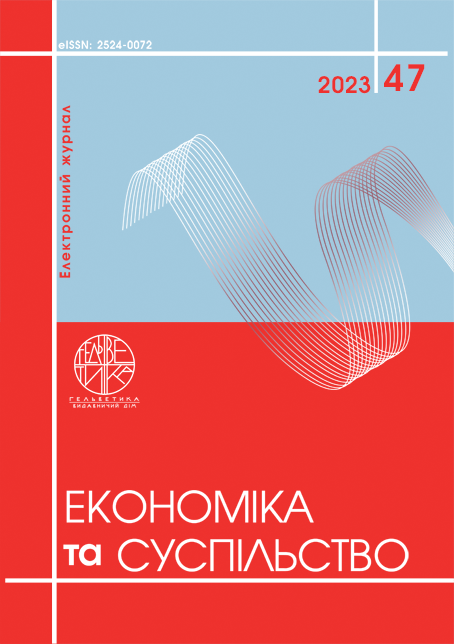THE ROLE OF THE ECONOMIC COOPERATION ADMINISTRATION (ECA) IN THE IMPLEMENTATION OF THE MARSHALL PLAN FOR THE RECONSTRUCTION OF EUROPE AFTER WORLD WAR II
Abstract
The Marshall Plan was implemented by the United States of America in Western Europe between 1948 and 1951. Given that it became an effective programme for restoring the economies of seventeen European countries destroyed by the Second World War and a model for imitation, it is advisable to analyse the experience of its implementation from the perspective of using it to restore the Ukrainian economy after the Russian-Ukrainian war. The purpose of the article is to analyse the management of the implementation of the Marshall Plan by the Office for Economic Cooperation and the effectiveness of this process. The theoretical and methodological basis of the study are the scientific works of leading foreign and Ukrainian scientists. The methods of critical and scientific analysis, scientific generalisation and systematisation, induction and deduction were used in the study of scientific problems related to the peculiarities of foreign aid provision and the expediency of creating a separate government agency for this purpose in the post-war period. The article examines a number of internal and external factors that influenced the effectiveness of the Economic Cooperation Administration (ECA), including the constructive purpose of the plan that the ECA was to administer, the shift in emphasis from economic reconstruction to military security, prior substantive training, staffing, balance of functions, direct management, regional representation and missions in countries participating in the reconstruction programme, relations with Congress and citizens' groups, and public information. It is concluded that the creation of a separate government agency to administer the implementation of the Marshall Plan was appropriate, as the efficient organisation and separation of management from existing government departments allowed for flexibility, less bureaucracy and the attraction of highly qualified staff. The study of the experience of the ECA is useful for Ukraine in view of the prospect of implementation of the programme of recovery of the Ukrainian economy, and the creation of a separate governmental body for this purpose is also advisable in Ukraine in order to ensure its flexibility, efficiency and faster response to the needs and actions of partners and donors of foreign assistance, taking into account the influence of factors that may reduce or increase the efficiency and limit the possibilities of such an institution.
References
Bayard P. H. The Marshall Plan and Its Meaning. Cornell University Press. 1955. 424 p.
Eichengreen B., Uzan M., Crafts N. and Hellwig M. The Marshall Plan: economic effects and implications for Eastern Europe and the former USSR. Economic Policy. 1992. Vol. 7. No. 14. P. 13–75. DOI: https://doi.org/10.2307/1344512
Machado B. F., In Search of a Usable Past: The Marshall Plan and Postwar Reconstruction Today. The George C. Marshall Foundation. 2007. 186 p.
Sorel E., Padoan P. C. The Marshall Plan: Lessons Learned for the 21st Century. OECD. 2008. 125 p.
Богдан Т.П. Основні принципи формування і спрямування міжнародної фінансової допомоги для України. Економіка України. 2015. № 4. С. 36–44. URL: http://nbuv.gov.ua/UJRN/EkUk_2015_4_7
Геєць В. М. До питання застосування підходів "плану Маршалла” для України. Економіка України. 2015. № 4. С. 6–11. URL: http://economyukr.org.ua/?page_id=723&lang=uk&aid=552
Кістерський Л. Л. Формування сучасної Європи: стримування та розвиток. Економіка України. 2015. № 4. С. 19–27. URL: http://nbuv.gov.ua/UJRN/EkUk_2015_4_5
Bayard, P. H. (1955). The Marshall Plan and Its Meaning. Cornell University Press. 424 p.
Eichengreen, B., Uzan ,M., Crafts, N. and Hellwig, M. (1992). The Marshall Plan: economic effects and implications for Eastern Europe and the former USSR. Economic Policy. Vol. 7. No. 14. pp. 13–75. DOI: https://doi.org/10.2307/1344512
Machado, B. F. (2007). In Search of a Usable Past: The Marshall Plan and Postwar Reconstruction Today. The George C. Marshall Foundation. 186 p.
Sorel, E., Padoan, P. C. (2008). The Marshall Plan: Lessons Learned for the 21st Century. OECD. 125 p.
Bogdan, T.P. (2015). Osnovni pryntsypy formuvannya i spryamuvannya mizhnarodnoyi finansovoyi dopomohy dlya Ukrayiny [Basic principles of formation and directions of the international financial aid for Ukraine]. Ekonomika Ukrayiny – Economy of Ukraine. № 4. Pp. 36–44. Retrieved from: http://nbuv.gov.ua/UJRN/EkUk_2015_4_7. [in Ukrainian].
Heyets, V. M. (2015). Formuvannya suchasnoyi Yevropy: strymuvannya ta rozvytok [To the question of application of the approaches of the «Marshall plan» in Ukraine]. Ekonomika Ukrayiny – Economy of Ukraine. № 4. Pp. 6–11. Retrieved from: http://economyukr.org.ua/?page_id=723&lang=uk&aid=552. [in Ukrainian].
Kisters’kyi, L. L. (2015). Formuvannya suchasnoyi Yevropy: strymuvannya ta rozvytok [Formation of modern Europe: containment and development]. Ekonomika Ukrayiny – Economy of Ukraine. № 4. Pp. 19–27. Retrieved from: http://economyukr.org.ua/?page_id=723&lang=uk&aid=554. [in Ukrainian].


